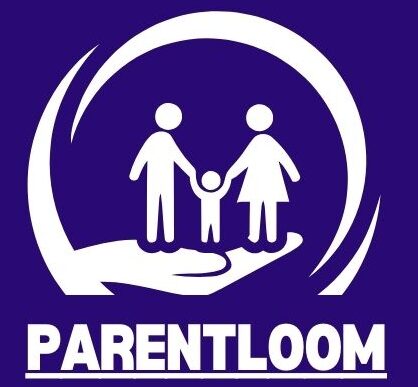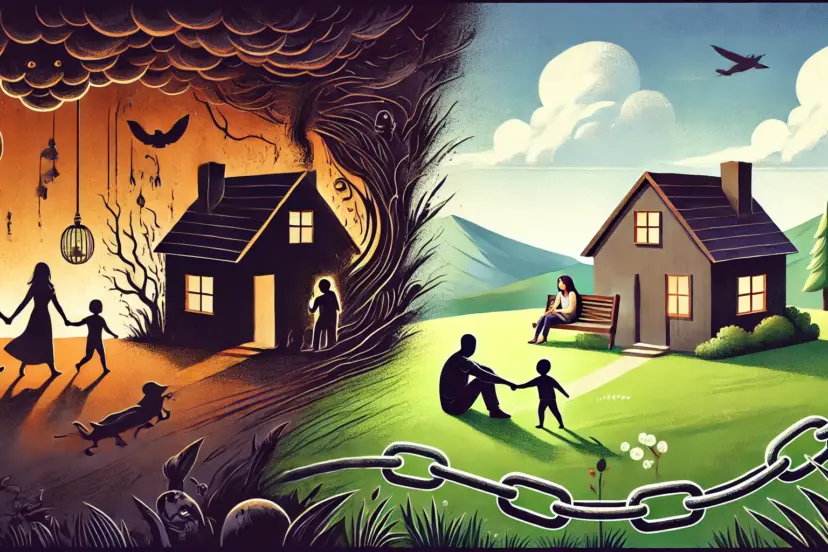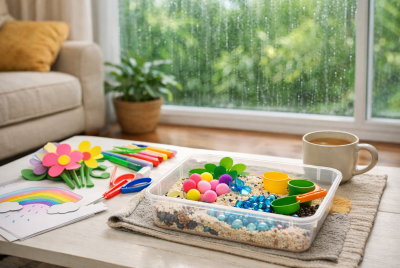Crooks Parents: Unpacking the Complexities of Toxic Parenting
We may earn a commission for purchases made using our links. Please see our disclosure to learn more.
Being a parent is difficult, uncertain, and often terrifying, like riding a rollercoaster while wearing a blindfold. (Been there, seen that!) Although the majority of parents want to assist and nurture their children, some people make this holy duty far more difficult. Let’s explore the dark realm of “crooks parents” and examine what actually transpires when the people who are supposed to protect you turn into your greatest emotional obstacle.
What Does “Crooks Parents” Mean?
Although it may seem that such at times, the phrase has nothing to do with actual criminal action. More akin to emotional scam artists, “crooks parents” are skilled manipulators who pose as loving parents. Picture a wolf wearing a warm sweater, promising protection while covertly attempting to destroy your entire identity. (Is it dramatic? Perhaps; is it accurate? Definitely.)
How Do Crooks Parents Impact Children?
The damage runs deep. These kids grow up feeling like they’re constantly walking on emotional eggshells. (Picture a childhood where every interaction feels like navigating a psychological minefield.) The very people who should be your safe harbor become the source of your deepest wounds, leaving scars that aren’t visible but are profoundly felt.
Signs You Might Be Dealing with Crooks Parents Red flags?
More like red billboards. These parents have a PhD in emotional manipulation. Gaslighting, control, and emotional neglect aren’t just occasional tactics—they’re their primary communication style. It’s like having a relationship status that reads: “It’s complicated” on permanent repeat.
Manipulation: The Weapon of Choice
Think of manipulation as their superpower. These parents are emotional puppet masters, pulling strings to make you dance to their tune. Every conversation becomes a strategic game, where you’re always three moves behind. (And trust me, they’ve been practicing this game way longer than you.)
Emotional Exploitation: The Silent Killer
Emotional exploitation is like a slow leak in your psychological tire. These parents drain you emotionally, treating you more like a resource than a human being. Your feelings? Optional. Their needs? Mandatory. It’s an unbalanced equation that never quite adds up.
Gaslighting: The Mind Game
Gaslighting is their favorite party trick. Reality becomes whatever they decide it should be. Said something that happened? Nope, didn’t happen. Felt a certain way? Clearly, you’re mistaken. (It’s like being in a never-ending episode of a psychological thriller, but this is your actual life.)
The Mask of Perfection
To the outside world, these parents are picture-perfect. Community leaders, church volunteers, the kind of people who get “World’s Best Parent” mugs. But behind closed doors? A completely different story. (Think of it as the world’s most elaborate magic trick—except the magic is emotional manipulation.)
The Role of Cultural Norms and Societal Expectations
Cultural expectations can be like quicksand for victims of toxic parenting. Respect your parents, they say. Honor them, no matter what. (But what if “honoring” them means sacrificing your own mental health?) These norms can transform toxic behavior into an acceptable family dynamic.
Breaking Free: Recognizing the Toxicity
Recognizing the problem is like turning on a light in a dark room. Suddenly, everything becomes clear. It’s not you; it’s their deliberately constructed maze of emotional confusion. (Liberation starts with this single moment of clarity.)
Setting Boundaries: Your Protective Shield
Boundaries aren’t walls; they’re healthy fences. Crooks parents hate them because boundaries interrupt their control game. Start small—limit conversation topics, reduce access, protect your emotional space. (Think of it as emotional self-defense classes.)
Self-Validation: Rebuilding Your Confidence
Growing up with crooks parents is like trying to grow a plant in rocky soil. Your self-worth needs intentional nurturing. Every positive affirmation is a drop of water, slowly transforming that barren landscape into a flourishing garden of self-love.
Forgiveness: A Gift to Yourself
Forgiveness isn’t about absolving them—it’s about releasing yourself from the emotional anchor they’ve been. Imagine cutting a rope that’s been holding you underwater. Suddenly, you can breathe. (And breathing feels incredible.)
Therapy: A Safe Space for Healing
Therapy isn’t admitting defeat; it’s choosing victory. A good therapist becomes your personal tour guide through the landscape of your experiences, helping you map out healing routes you never knew existed.
The Ripple Effect: How Crooks Parenting Impacts Future Generations
Toxic parenting is like an emotional inheritance nobody asked for. Without intervention, these patterns can echo through generations. Breaking the cycle isn’t just about you—it’s about rewriting the family narrative.
Building a Support Network
Your chosen family can be your lifeline. Surround yourself with people who see your worth, who lift you up instead of constantly trying to clip your wings. (These are the real MVPs of your healing journey.)
Choosing to Be Different: Breaking the Cycle
If you become a parent, you have the power to rewrite the script. Every loving choice is a rebellion against the toxic patterns you experienced. (Talk about the ultimate plot twist!)
When Confrontation is Necessary
Confronting crooks parents isn’t about winning—it’s about establishing your truth. Approach it like a calm, prepared diplomat. Your goal? Emotional clarity, not necessarily transformation.
Coping with Guilt
Guilt is a manipulative echo from your past. Recognize it, acknowledge it, then show it the door. Your healing is more important than maintaining a toxic status quo.
Rediscovering Your Identity
Toxic parenting can make you feel like a rough draft of yourself. Rediscovery is an adventure—explore your passions, challenge your assumptions, rebuild from the ground up.
Living Your Best Life You deserve joy, respect, and genuine love. Focus on building a life that feels authentically yours. (Spoiler alert: The best revenge is a life beautifully lived.)
Resources for Understanding and Addressing Toxic Parenting
For those seeking to comprehend and mitigate the effects of toxic parenting, several insightful books are available:
- “The Whole-Brain Child: 12 Revolutionary Strategies to Nurture Your Child’s Developing Mind”
Authored by Daniel J. Siegel and Tina Payne Bryson, this book offers strategies to promote healthy brain development in children, aiding parents in fostering balanced emotional and intellectual growth. - “Raising Good Humans: A Mindful Guide to Breaking the Cycle of Reactive Parenting and Raising Kind, Confident Kids”
Hunter Clarke-Fields provides mindfulness techniques to help parents respond thoughtfully rather than reactively, promoting a nurturing environment.
Amazon - “Good Inside: A Guide to Becoming the Parent You Want to Be”
Dr. Becky Kennedy’s book focuses on understanding and addressing one’s parenting challenges, offering practical advice to foster a positive parent-child relationship.
Scientific Insights into Toxic Parenting and Its Impact
Research has consistently highlighted the detrimental effects of toxic parenting on child development. A study titled “Toxic Parenting Adversely Correlates to Students’ Academic Performance in Secondary Schools” explored the relationship between toxic parenting behaviors and academic outcomes among secondary school students in Kenya. The findings revealed that negative parenting practices, including physical and emotional abuse, were significantly linked to lower academic performance. Similarly, a study led by Stanford University, “Study Reveals Impact of Too Much Parental Involvement”, examined how excessive parental involvement can adversely affect children. While engaged parenting is generally beneficial, the research found that over-involvement often results in heightened stress and stifled autonomy in children, ultimately hindering their growth. These studies emphasize the need for balanced, supportive parenting approaches to foster better outcomes for children.
Conclusion: It’s Time to Take the Reins
Dealing with crooks parents is a journey, not a destination. By recognizing the toxicity, setting boundaries, and prioritizing your growth, you reclaim your narrative. You are not a victim—you are a survivor, writing your own magnificent story.
FAQs About Crooks Parents
Can crooks parents change?
Rarely. Your energy is better spent on your own healing journey.
How do I deal with guilt after distancing myself?
Guilt is a programmed response. Healing isn’t linear, and your well-being comes first.
Should I confront crooks parents?
Depends on your situation. If it brings closure, approach with clear boundaries and minimal expectations.
Can therapy really help?
Absolutely. Think of therapy as emotional physiotherapy—helping you rebuild strength and mobility.
How do I stop the cycle of toxic parenting in my family?
Self-awareness is key. Learn, grow, and intentionally choose different patterns. Your future generations will thank you.




